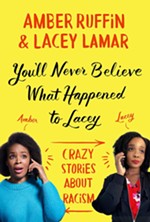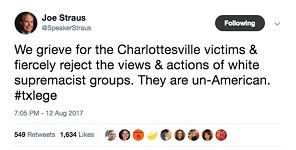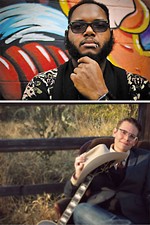An Archive of Reelings
Reflections on a town hall meeting: A love letter to "community"
By Andy Campbell, 5:35PM, Wed. Jan. 8, 2014

It’s that time of year, when conversations about assessment and reflection and personal goals are particularly germane – the “I want to be fitter, more thoughtful, more responsible, more confident, I’m-getting-a-gym-membership-and-a-juicer-now” kinda conversations.
Assessing how we move forward helps us to understand the recent past. And it’s been a bit of a rough one for the queer communities in Austin. Big pride and big shame – and growth happens when we mull on both.
There’s an ideation of community (from fancy academic on-high via Jean-Luc Nancy) that it is not togetherness that defines community, but the spacing between various differences, the fractures and fault-lines. We are in common, which is not to say the same. In considering this, we honor the multiplicity of our communities (and of our own non-sovereign selves). In other words, rather than touching, community can be about not touching. Some people hold this particular formulation of community just as deeply as others hold the formulation of community as unity/togetherness.
But while this particular definition may appear cynical or negative (unmaking, the space between) the affect, the feelings don't have to be. And this is perhaps one essential paradox of community – that many people have different definitions of what community actually is.
For the first time in a long time, there was broad queer community traction this year on addressing questions of racism (concatenated with gender performance) within our own community. This came to a rolling boil this past May with the organization of Queer Questions: A Town Hall on Drag and Performance; which was specifically spurred by PooPoo Platter’s Sequin de Mayo Chola Pageant and its attendant initial publicity imagery of a Latina behind bars, and to a lesser (and more general) extent, the performance-persona of Christeene.
The Town Hall Facebook event page proclaimed, “This event is an opportunity for us to gather in the same space and address concerns that affect us all. The hope is that, by having these conversations, we will reach mutual understandings that benefit all of us in the queer community of Austin. Everyone is welcome and encouraged to attend.”
Named organizers initially included Nicole Arteaga, Jules Minkoff, and James McMaster. It became clear in ensuing comment threads that the others were helping to organize the event. Erin Bunny Burrows and Morgan Robyn Collado's names were added as hosts. The organizers chose Matt Richardson, Professor of Africana Studies at UT and Juniper Lauren, a facilitator and trainer with The Alliance of Community Trainers to moderate and facilitate the event.
But the town hall, attended by more than 100 interested queers and non-queers felt, from where Gay Place editor Kate Messer and I sat, more like breakdown and breakup than exploratory conversation. We feel that such a breakdown of community (our frame borrowing loosely from the definition of “community” offered above) should not be seen as community stretched to its limit, but pushed towards its heart. It was also fucking annoying. But more to the point: reductive.
As some in the crowd snapped in the air to voice approval and agreement, personal stories and thoughts in some cases seemed geared – not towards discussing the issues at hand and honoring their inherent complexities, but – to accrue snaps. Some who also voiced intensely personal stories, or at times dissenting views, got no snaps. Snap?
The disagreements did not handily break down along people of color (POC)/non-POC lines, yet there did seem to be (via the accretion of snaps) a supposed POC position (never defined explicitly), which when contradicted by someone legitimately POC (whether apparent to those in the crowd or not) – and definitely when questioned or contradicted or simply ill-stated by non-POC – would gain the audible ire of a portion of the crowd at large. This behavior was totally confounding.
Thinking about it now reminds me of Ngọc Loan Trần’s beautiful post, “Calling In: A Less Disposable Way of Holding Each Other Accountable” on Black Girl Dangerous.
In it, Trần discusses the disillusionment that occurs when a roomful of people who “get it” (or, I would add, want to “get it”) are uncharacteristically unsympathetic towards one another. Instead of “calling out” our friends, lovers, and allies, Trần wonders what “calling in” looks like. Nearly the whole post is fabulous.
Seriously, go read it now.
While I appreciated the kinds of conversations that were eked out of this highly contrived and theatrical facilitation session (small group exercises, a highly visible and awkward “exit” door in case things got too heated, “fishbowl” conversations) – I left with three primary questions: Where was the love? Where was the pleasure? And where was the art?
On the first two points: Where was the liberation, the open-heartedness, and the pleasure of de-colonizing our minds? (And let’s reserve judgment on who specifically needed that work.) People came to the meeting willingly, knowing difficult topics would be discussed. We looked for the pleasure. Instead, these vital processes as presented felt punitive, and the style of their presentation left them barely beyond the pale of dour and solemn.
True, there’s a place for dour and solemn, but there is joy and inherent humor in the process of discovery and learning as well. Feeling good with one another, next to one another provides some balm. I think I can speak for Kate and say that the joy we did find was in feeling the bravery, of seeing faces coming out from behind the Internet and Facebook, even (and often especially) if we didn’t agree with each other.
Is it terrible, then, that when one of the facilitators asked at the end: “Where do we take this?” my first thought was, “to the bedroom”? (And that's not even where I like to get down.) During the Town Hall I worried about kindness and care. And about the flattening out of lived experiences and art. The former got a fair hearing that night; in some cases, depending upon the person and the narrative, the minutiae were pored over and in others they were passed over entirely.
There was a lot of navel gazing, but “not all belly buttons were treated equally” (Thanks, Kate X). This certainly could be filed under the methodology of the intent vs. impact formula in social justice organizing that holds that the impact of someone’s words/actions always matter more than the intent of the words/actions. In fact, that was mentioned specifically. It’s a clever and useful tool for re-orienting who exactly is being placed in the “subject” position of the conversation, but its use-value is negated when intent is ameliorated completely.
Or as Kate said afterwards as we were discussing in the car, “nobody related the impact formula with regards to the forum itself.” There certainly was impact. Many – on all sides – left hurt and unheard. Does that wipe out the intent? We’ve been very careful to give credit where credit is due, and we do feel that the intent behind this form was not only valid but productive. The impact, however, is debatable.
On to the second point: I am a fan of difficult conversations in and around art. I've never been one to hide behind the smokescreen of formalism (although interestingly, queers are more and more turning to formal abstraction as a pictorial mode – go figure). I love when art is the center of heated dialogue and debate, and there were many points made during the town hall about thinking and interrogating creativity that were pitch perfect. What I did not appreciate was the un-nuanced reading of art (performance or otherwise) offered. As though art were always documentation of some kind! As if the world were so starkly rendered!
Terms such as “shock drag” were not interrogated, but used blithely. Performances were never talked about in their specificity, but talked about generally. I would have liked to have an earnest discussion about Christeene's well-rehearsed and choreographed performance and persona, or the Poo Poo Platter events which are more anarchic, explorative, and steeped/mired in the residue of punk rock and as PPP founder Bulimianne Rhapsody says, “tongue-in-cheek,” and “to push buttons and to get people thinking about why [PPP] is doing so.”
The devil's in the details at these shows, and there was zero engagement with what actually goes on. Leaving me to wonder if we were meant to be upset at the idea of what goes on, or the actualized performances? Both matter, but both are apiece of the other.
The intent behind calling this forum a town hall meeting seemed to imply invitation, and a desire to bring together community. The subject matter at hand rightfully involves navel-gazing, but without a discussion of specific details of these shows, without an awareness of what happens at them, without attending them, what many were left with was empty hand-wringing.
We have to look at the entire belly. Hard. And that's exhausting. And as much as I support pointing to oppression, when this strategy is unaccompanied by a discussion of the gross ambivalences of any sort of cultural production, the “calling out” of others fails to be more than an exercise in pedantics. Of course, referring to Trần’s piece, assuming that the people we want to “call in” are people we care deeply about – that kind of care may ultimately be more challenging than “calling out.”
There are those, for example, who consume a Christeene performance unthinkingly – and that's them. Honestly, I don’t envy these phantom consumers, because they're only seeing a quarter of the messy, glorious story. But for those looking for some hooks to hang onto, to misquote Gertrude Stein, there is a there there. I would argue any number of potentially radical “theres” for any number of viewers. And I further argue that delving into how performances like Christeene’s, and nearly every other drag performance in Austin, teeters on the thin line of appropriateness, appropriation, tastefulness, taste, class, cheap-shot, and brilliance. Open-hearted conversations about such messes contain that great radical potential.
I should end by thanking the organizers and instigators of the event, and there's certainly a part of me that is sincerely grateful. It takes time and energy to bring that many queers to the same room at the same time (just ask QueerBomb). Some powerful things were said – and many not-so-powerful. There's another part of me, however, that believes our time would have been better served interrogating the things that needed interrogating. Fucked up shit (technical term) was said in that room by so many – by most. But the fucked up shit I heard is not the fucked up shit my neighbor heard. And there’s. the. catch.
So now we know the fucked up shit we think about each other.
Let's never touch.
Nota Bene: This piece was borne out of many conversations after the town hall and through years of engagement between Kate and I… as friends, road- and music-buddies, editor-writers; we share a lot in common. Yet we are placed generationally, gender-presentationally, and I would argue ethnically (Jew/Catholic), in difference to one another. Our conversations have been intense and focused, and we think and re-think fiercely what it means to be participants, observers, creators, and instigators in Austin’s queer worlds. For myself, I mull these conversations as I’m devising reading lists for the courses I teach at Texas State University, on race and visual representation, feminism, and class aesthetics. Are Jean Genet’s The Blacks: A Clown Show and Coco Fusco’s The Bodies That Were Not Ours going to be significant additions to my students’ libraries (both physical and mental)? Can I teach them to see race as a broader metaphor for organizing the Modern world through examining a seemingly innocuous canonical text such as The Time Machine by H.G. Wells, so that when we read Edward Said, Octavia Butler’s Wild Seed, or view Rashid Johnson’s “branding” paintings they’ll get it? (Of course they’ll be unpacking the invisible knapsack, walking over the bridge called my back, and thinking about the framer framed, too.) The work continues…
A note to readers: Bold and uncensored, The Austin Chronicle has been Austin’s independent news source for over 40 years, expressing the community’s political and environmental concerns and supporting its active cultural scene. Now more than ever, we need your support to continue supplying Austin with independent, free press. If real news is important to you, please consider making a donation of $5, $10 or whatever you can afford, to help keep our journalism on stands.
Michael King, April 13, 2021
Mary Tuma, Aug. 14, 2017
Katherine McNevins, March 16, 2020
Katherine McNevins, March 16, 2020
Nov. 4, 2015
Racism, Community, Queer Questions, Town Hall, intention, impact, race, Poo Poo Platter, Christeene, Chola Pageant, Sequin de Mayo












